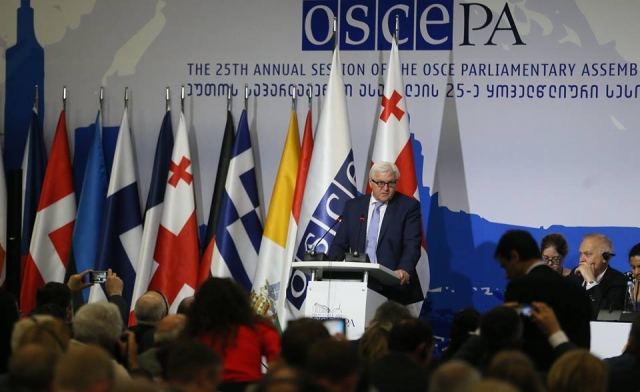Berlin’s Top Diplomat Visits Georgia to Discuss OSCE Mission, EU Policy
TBILISI – German Foreign Minister Frank-Walter Steinmeier said in his opening remarks at the start of the 25th annual session of the Organization of Security and Cooperation in Europe (OSCE) Parliamentary Assembly in Tbilisi on July 1 that he supports Georgia’s further integration into Europe via a visa-free travel regime but said Negotiations aimed at settlement ongoing conflicts in the Caucasus region are moving slowly.
Steinmeier did say, however, that the European Union will begin offering short-term visa-free travel to Georgians by the end of September.
He added that the main formalities and mechanisms needed to begin visa-free travel for Georgians and Ukrainians would likely be finalized by the end of July and put into force by the end of the summer, Steinmeier said after a meeting with his colleague Mikheil Janelidze.
Georgia had hoped that the visa-free regime would come into force by July. The process was later delayed by Germany, France and Belgium suddenly halted the implementation process in June, saying they were worried about organized crime syndicates in Western Europe with ties to Georgia.
As the current OSCE chairman, Steinmeier also commented on the conflict in Nagorno-Karabakh and the two Russian-occupied Georgian breakaway regions, Abkhazia and South Ossetia.
Steinmeier was quick to temper expectations, saying he anticipates that the talks will drag on indefinitely until both sides kind find a basic compromise.
Russia has occupied Abkhazia and South Ossetia, with the assistance of pro-Moscow separatists, since shortly after the breakup of the Soviet Union. Georgia fought and lost three wars against the Russian armed forces and their proxy allies between 1991-2008. By the end of the last conflict, more than a quarter of a million Georgians had been ethnically cleansed from the two regions, and Moscow occupied more than 20 per cent of Georgia's territory.
The OSCE has had an active monitoring group in the region that oversees developments along the international contact lines that separate the two regions from the jurisdiction of the Georgian government.












